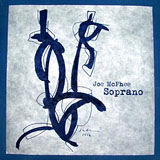Home » Jazz Articles » Album Review » Joe McPhee: Soprano
Joe McPhee: Soprano
On September 10, 1998, Joe McPhee performed solo in St. Georges Chapel in Guelph, Canada at the Guelph Jazz Festival. He played the soprano sax. The recording of this performance appears on vinyl in an edition of 553 from Roaratorio.
The musicality encountered in each of the four pieces transcends any quotidian meaning of the word. How McPhee evolves one sound idea into another is his talent. He demonstrates his inveterate principles for exploration and discovery. Encapsulated with the inviolability of this sincerity, his creations penetrate any barrier which could come between him and the listener. The shape of his ideation is direct; the underlying message is deep and the beauty of the music, awe-inspiring.
McPhee carefully selects the tools to construct a performance that lacks nothing within the concept for his presentation. Aware of the acoustics of the chapel from a performance by his colleague, Pauline Oliveros, McPhee chooses to play the soprano as a means to meet the challenge of maximizing the character of the venue. Combine the agility of his fingering with the space around him and the outcome is "Response Ability Part I, on the first side of the record.
It might help to imagine the soprano as a vehicle for telling a story that is about the moods and motion of the instrument. Several simple centering points of repeated two- or three-note phrases become the launch pad for series after series of stunning transformative vagaries. A sense of wonder might remain in the listener after the eighteen-minute piece concludes peacefully, to exist just for a moment, for "Response Ability Part II quickly follows. This improvisation marries an invented melody with a slowly divulged textural innocence to foster a partnership that evokes a tinge of yearning.
On side two of the record, "A Night on Rose Mountain rises from a "miniaturized electronic support system which casts a veil of choir-like humming through the sonic environment. It embraces the intervention of the horn which plays high against and tunefully to the depth of the rarely shifting electronic drone. McPhee closes the album with a piece that sculpts an arrangement of isolated notes into a collection of slurred ones that touch on hints of melody. "In Order To Hear concludes with a poetically posed caveat uttered with McPhee's velvety bass voice.
Within the last piece is a lesson that extends far beyond the eight minutes that have passed. To listen to music is one thing; to absorb its effect is completely another. For, in the end, realizing that music bears an irrevocable force alters its perception, forever.
Track Listing
Response Ability Part I; Response Ability Part II; A Night on Rose Mountain; In Order To Hear.
Personnel
Joe McPhee
woodwindsJoe McPhee: soprano sax.
Album information
Title: Soprano | Year Released: 2007 | Record Label: Roaratorio Records
< Previous
Bewitched
Next >
Piano Solo
Comments
Tags
For the Love of Jazz
 All About Jazz has been a pillar of jazz since 1995, championing it as an art form and, more importantly, supporting the musicians who create it. Our enduring commitment has made "AAJ" one of the most culturally important websites of its kind, read by hundreds of thousands of fans, musicians and industry figures every month.
All About Jazz has been a pillar of jazz since 1995, championing it as an art form and, more importantly, supporting the musicians who create it. Our enduring commitment has made "AAJ" one of the most culturally important websites of its kind, read by hundreds of thousands of fans, musicians and industry figures every month.




















